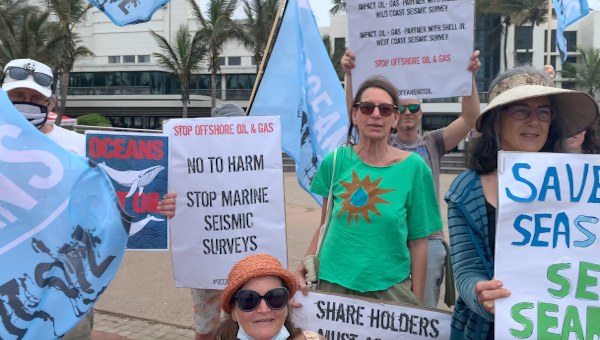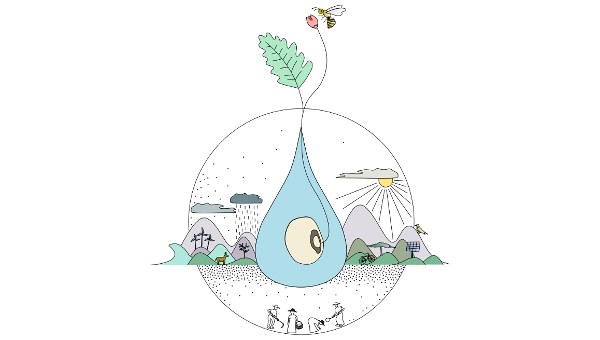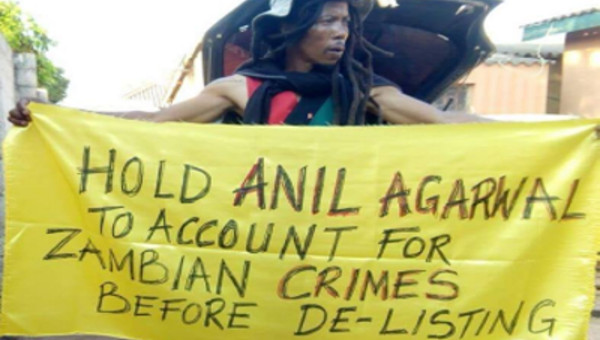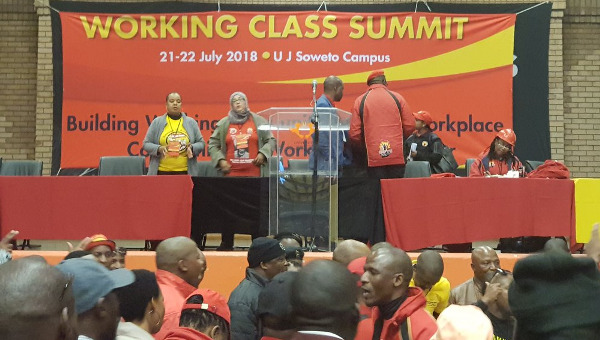A Climate Justice Critique of South African Political Parties
What are the commitments of the ANC, DA and EFF to a Deep Just Transition to Sustain Life?
South Africa goes to its 6th national elections on May 8th, 2019, with 48 contesting parties. This is in a context in which inequality is worsening, costs of living are going up and unemployment is a major challenge. This election is also happening while South Africa’s worst drought in recorded history is still ravaging various villages and towns. All our political parties have failed to recognize the drought as a climate shock. All seemed surprised by cyclone Idai, another climate shock, and its devastation.
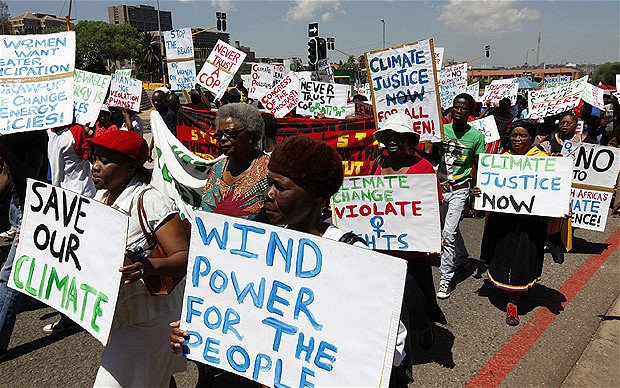 The science on climate change from the UN Intergovernmental Panel on Climate Change (IPCC) is clear that as planet earth is heated through more greenhouse gas emissions (from burning coal, oil and gas) we will have more extreme weather shocks such as droughts, heatwaves, floods, cyclones and more. We are currently at 1.2° Celsius hotter since before the industrial revolution and are fast heading to a 1.5°C overshoot unless over the next 12 years we cut emissions by 45 per cent to 2010 levels and to net zero by 2050. We have 12 years to prevent catastrophic climate change.
The science on climate change from the UN Intergovernmental Panel on Climate Change (IPCC) is clear that as planet earth is heated through more greenhouse gas emissions (from burning coal, oil and gas) we will have more extreme weather shocks such as droughts, heatwaves, floods, cyclones and more. We are currently at 1.2° Celsius hotter since before the industrial revolution and are fast heading to a 1.5°C overshoot unless over the next 12 years we cut emissions by 45 per cent to 2010 levels and to net zero by 2050. We have 12 years to prevent catastrophic climate change.
This climate justice critique is based on a reading of party manifestos. It applies to all political parties while making specific critiques of the African National Congress (ANC), Democratic Alliance (DA) and Economic Freedom Fighters (EFF), the larger parties in South Africa’s current political system.
General Climate Justice Critique of Political Parties
The climate crisis is a systemic crisis of carbon driven global capitalism. It has its origins in 150 years of fossil fuel extraction and use by rich industrialized countries. Industrializing countries like China, Brazil, India and Russia control substantial amounts of fossil fuel reserves today. South Africa’s coal addiction also makes it a carbon criminal state. Its use of coal intensifies climate change and its impacts through extreme weather events, including on the continent. More climate change brings climate inequalities and injustices through escalating food and water costs as well as job losses. Many farm workers have been retrenched in the context of South Africa’s drought. None of the parties understand climate change as a dangerous contradiction driven by carbon capitalism and the need for South Africa to be a climate justice state in relation with its people, on the continent and the world stage.
The climate crisis is a complex and interconnected crisis. Given that carbon is not just extracted but is also used as a major energy source across economies. Moreover, carbon energy use differs from sectors. In South Africa at least 9 per cent of emissions come from globalized agriculture. Carbon is also used in various industrial processes such as construction. An energy transition to socially owned renewables is just one part of the challenge. Decarbonizing the economy is a broader challenge. Moreover, as climate shocks continue we need new adaptive systems that sustain life. We have to recognize the interconnections of cause and multiple effects. Cyclone Idai and its effects could have been mitigated if there were proper disaster management systems, media reporting, dam management, food sovereignty systems, health systems, functioning across the country for example. Instead, river flooding started before Idai hit landfall in central Mozambique, dam walls failed, there was inadequate communication to warn people and disaster management systems have been overwhelmed. Cholera, hunger, lack of access to healthcare and water stress are claiming lives besides the direct impact of the cyclone. South Africa’s drought, another example of a climate shock, has also had several effects on society, economy and ecological relations. None of the political parties understand or would like to voice the complexity of the climate crisis.
We have a crisis of climate leadership among all South Africa’s political parties and none are committed to ensuring South Africa, the region and the continent is on a climate emergency footing. Being on a climate emergency footing means advancing a deep just transition/s to ensure regulated, purposive, ambitions and planned reductions in carbon emissions to prevent a 1.5°C overshoot and the necessary adaptive systems are in place that transform energy, production, consumption, finance and public systems through democratic systemic reforms to ensure workers, the poor and the vulnerable do not pay the price of the transition and climate shocks. Such a deep just transition is led by the working class and mass social forces, rooted in a red-green alliance seeking climate justice.
None of South Africa’s parties understand the climate crisis as part of larger ecological crisis. More extraction, pollution, chemical based agriculture, waste, deforestation and over consumption are undermining natural cycles of the earth system and accelerating species extinction. Several planetary bio-physical limits (fresh water, land use, ocean acidification, bio-geochemical flows, for example) are being breached and capitalism’s ecocidal logic is creating a toxic and unlivable world. We need to reconnect with the web of life, recognise we share the planet with other life forms that have rights and have to rethink everything from the standpoint of eco-centric ethics and the deep just transition. None of the political parties are making these arguments to confront the ecocidal logic of capitalism.
Climate Justice Critique of the African National Congress (ANC)
The ANC as the ruling party in South Africa has locked South Africa into the pledge and review mechanism of the United Nations. The ANC government turned its back on a climate justice approach to the historical debt owed by rich industrialized countries, to ambitious regulated reductions in carbon emissions and is certainly not positioning South Africa as a climate justice state on the continent. Moreover, its response to the drought, as a major climate shock, has been dismal. A national disaster was declared in early 2018 after the food system collapsed, many communities were ravaged by the drought and after the national department of water affairs was looted, with various water delivery projects compromised. The drought continues in South Africa and there is no leadership from the ANC state to learn lessons and prepare for the next round of climate shocks. The drought and the climate crisis are not mentioned in the manifesto. There is no explicit theme in the manifesto dealing with the climate crisis.
The ANC manifesto vaunts its successes and is very self congratulatory. It reads as though South Africa owes the ANC a debt for the great job it has done based on a set of quantitative indicators showing grand successes and improvements. These magnitudes of success hide more than they reveal. South Africa has an economy in deep crisis; inequalities, unemployment and hunger have increased. The ANC takes no responsibility for this disaster and crisis of social reproduction it has led South Africa into for 25 years. Climate shocks will only deepen the suffering of the majority. Yet, the ANC manifesto makes no effort to bring to the fore the existential threat of the climate crisis.
The ANC proclaims a commitment to industrialization (including for localized renewable energy technology production), the ‘4th industrial revolution’, township economies, land reform, public transport, National Health Insurance etc. in a context in which state capture has fundamentally compromised the ability of the state to lead even modest reforms. The Arms deal, Nkandla, ‘Ace-Gate’ and BOSASA are only the tip of the rotten rubbish heap. According to the auditor general reports, 2017-2018, irregular expenditure in government was R72-billion. The majority of state entities audited had adverse findings. The country knows, through the Zondo Commission, how ANC factions have been engaged in state capture regarding Eskom (South Africa’s monopoly energy parastatal). The ANC cannot be trusted with leading industrialization of renewables, laying the basis for a transition to a renewable energy system, for resolving the challenges of Eskom and fixing our water systems. More state failure rather than the makings of a climate emergency state should be expected.
The ANC manifesto calls for gas and oil extraction in our oceans. It also understands renewables as a compliment to coal. All of this is linked to the investment game plan of raising investment levels to R1.3-trillion over the next four years. The ANC manifesto still envisages a deeply globalized economy, driven by the interests of transnational capital. Within that it is creating space for black industrial capital, agrarian capital, cooperatives and worker ownership in the economy through employee stock option schemes. De-racializing capitalism is at the heart of its multi-class project; a little bit more trickle down with a slightly broader base. Ironically globalization has never and will never be a development strategy let alone a basis to transform South Africa to deal with accelerating climate change. The ANC has an impoverished imagination with no new thinking; its manifesto merely reveals more of the same.
Climate Justice Critique of the Democratic Alliance (DA)
The DA failed to prepare Cape Town for its drought, despite science based warnings, academic warnings and more. Its day-zero approach placed a squeeze on poor households and passed on the pressure of managing the drought to working class, middle class and poor households. It did not challenge water ownership and control by white agricultural interests. It forced the use of desalination plants as an emergency measure and at great cost to tax payers. Moreover, high water levies raised billions for the DA led Metro while working class and poor households are faced with punitive tariffs that undermine their water needs. Day zero was about climate injustice and creating new climate inequalities. As a neoliberal party, the DA has expressed a ‘green neoliberal’ response to the drought which always privileges the wealthy. Hence it has encouraged thousands of boreholes in Cape Town and smaller towns, which is only affordable by the wealthy and which threatens the long run viability of aquifers in these areas.
The DA has a manifesto that deals explicitly with climate change and the need for a resilience plan. Several problems stand out. First, the DA views the Paris Climate Agreement as a viable instrument for dealing with emission reductions. It’s voluntary approach to reducing emissions and building a registry is really just about green wash. South Africa needs more than this to meet its reduction targets given the current science and urgency. Second, it supports fracking, nuclear and off shore gas extraction. Like the ANC, it still has a shallow conception of how to get to a zero carbon economy. Third, it has a private sector led approach to renewable energy. Essentially Eskom must make way for independent power producers that supply the national grid and local governments. There is no real concern for workers in Eskom or for the working conditions of workers in the renewables industry. Renewable energy capital, not workers, communities, households or public institutions, is the key driver of the energy transition in their manifesto. Fourth, the DA advocates carbon capture and storage as a solution for South Africa’s emission problems. This is an untried technology and a techno-fix that distracts from the need for a deep just transition to a zero carbon energy system.
The DA approach to water reflects the interest of white, agro-industrial capital, in the main. It recognises the impacts of the drought on farmers and hence champions more dams, infrastructure and policy support for these farmers. The DA does not question the fact that 62 per cent of South Africa’s water resources are controlled by these farmers. Moreover, this kind of mono-industrial agriculture failed South Africa in the drought; it collapsed. South Africa needs a new food system based on localization (not exports) small scale farmers, agro-ecology and seed, water and food sovereignty.
Climate Justice Critique of the Economic Freedom Fighters (EFF)
The EFF is a racist political party, Afro-chauvinist, with a strong authoritarian populist streak. Some would prefer to describe it as ‘Black Neo-fascist’. It is generally not clear what it stands for; it has contradictory policies and practices. One day it is for the constitution and another day against; one day against corruption and another day it’s leaders are implicated in corruption (VBS ‘bank heist’, tender hijacking in Metros, for example); one day for state ownership and another for stakeholder capitalism. Its manifesto has a section on ‘Environment and Climate’, while the document still supports a carbon, mainly coal based and mining driven economy. It’s commitment to addressing the climate crisis, let alone the larger planetary ecological crisis, is incoherent to say the least and its explicit target to reduce emissions by 10 per cent in 2024 is certainly not ambitious enough. It betrays a lack of understanding of the urgency of the climate crisis and scientific necessity to cut emissions even more drastically. This is a party without any progressive values. In general, it represents a nativist resource nationalism, which is exclusionary, opportunistic and its general orientation is against a climate justice politics that stands for all the workers, poor and vulnerable in our society – black and white.
The energy section is one that is probably the least progressive section of the manifesto. It has no original thinking on the energy transition challenge as part of the larger deep just transition. The EFF is state centric in its energy approach and supports the use of mixed energy sources, including so-called safe coal, nuclear energy, as well as, renewables. The plan outlined in the manifesto is that an EFF government will have a state owned company take over all Eskom owned coal mines and assist Eskom in establishing a renewable energy division, with the energy base still anchored on coal and nuclear. It will also end preferential pricing to big energy users. The EFF’s energy approach completely avoids and neglects the dangers of coal and nuclear, and shows a lack of understanding of the urgency to completely break from fossil fuels and false energy solutions to ensure a rapid transition to a zero carbon energy system based on socially owned renewables.
The EFF is committed to a resource nationalism based on reproducing South Africa’s toxic minerals-energy complex through a statist capitalism which has immense potential to be even more corrupt than what we are experiencing. Understanding the climate crisis in its interconnections requiring systemic alternatives to drive the deep just transition is absent. The EFF endorses the One Million Climate Jobs Campaign, while still committed to an energy program centered on coal and nuclear energy, merely, discrediting and making a mockery of the campaign. The EFF commits to the ‘Green Revolution’, as part of its understanding of agricultural transformation. The ‘Green Revolution’ is about productivist, corporate led agriculture. Such agriculture collapsed during South Africa’s drought and on a global scale contributes about 40 per cent to global emissions. This is not a systemic alternative to address the challenges of building a new food system in South Africa. On water issues, the EFF merely has a narrow ‘service delivery approach’. Yes, safe, clean water must be delivered to the people. But from the standpoint of the deep just transition our water resources are being compromized by more mining, including coal mining, which the EFF supports. An example of contradictory EFF practice is their support for the Xolobeni community’s rejection of mining. This is rather hypocritical given the EFF’s support for more mining. Corruption has affected water infrastructure delivery and the EFF is no shining example of fighting corruption. South Africa needs more than a shopping list approach to its water crisis. It needs a people driven water sovereignty approach to planning, managing and sharing our water commons.
Toward a Climate Justice Charter for South Africa
South Africa has a crisis of political leadership regarding the climate crisis. It is in this context we invite all living in South Africa to contribute to the Climate Justice Charter for South Africa to ensure we hasten the deep just transition to ensure the workers, the poor and vulnerable do not pay the price of climate change.
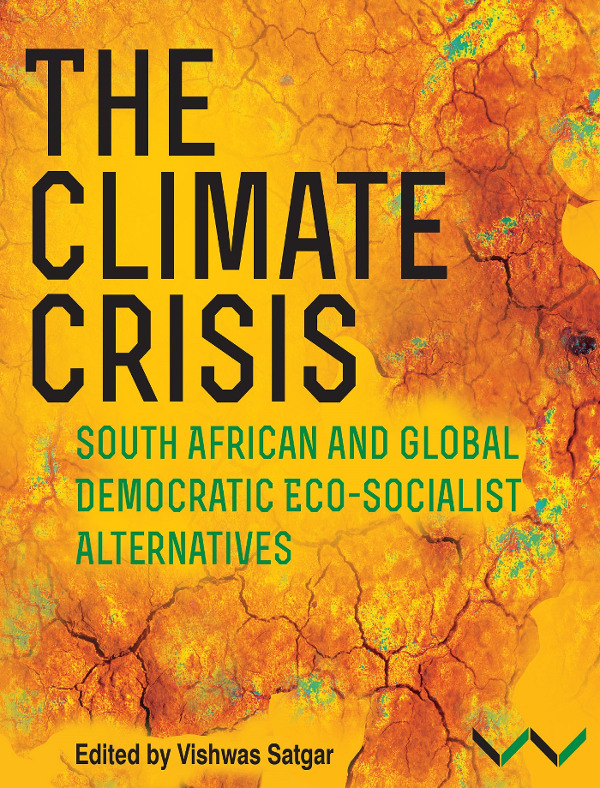 We also have an inter-generational obligation to act, now, to ensure present and future generations have a future. It is not too late to act to prevent the extinction of human and non-human life forms.
We also have an inter-generational obligation to act, now, to ensure present and future generations have a future. It is not too late to act to prevent the extinction of human and non-human life forms.
Key themes for the charter to be elaborated in grassroots dialogues relate to systemic alternatives that would bring down carbon emissions and ensure we sustain life as climate shocks hit. These themes include:
- Principles for the Charter.
- Our conception of the just transition for South Africa taking into account class, race, gender and ecological relations.
- Systemic alternatives related to land use, water, rights of nature, energy, food, production, consumption, waste, transport, housing, finance.
- The role of the climate emergency state and our international relations as a climate justice society.
- Communication, education and awareness raising to mobilize society.
- The role and form of people’s power from below.
This document is publicly being disseminated in South Africa through the Cooperative and Policy Alternative Center (COPAC), the South African Food Sovereignty Campaign and all allies involved with the Climate Justice Charter Process in South Africa. It was drafted by Vishwas Satgar, Board Chairperson of the Cooperative and Policy Alternative Center (COPAC). He is also a co-founder and activist in the South African Food Sovereignty Campaign. •


